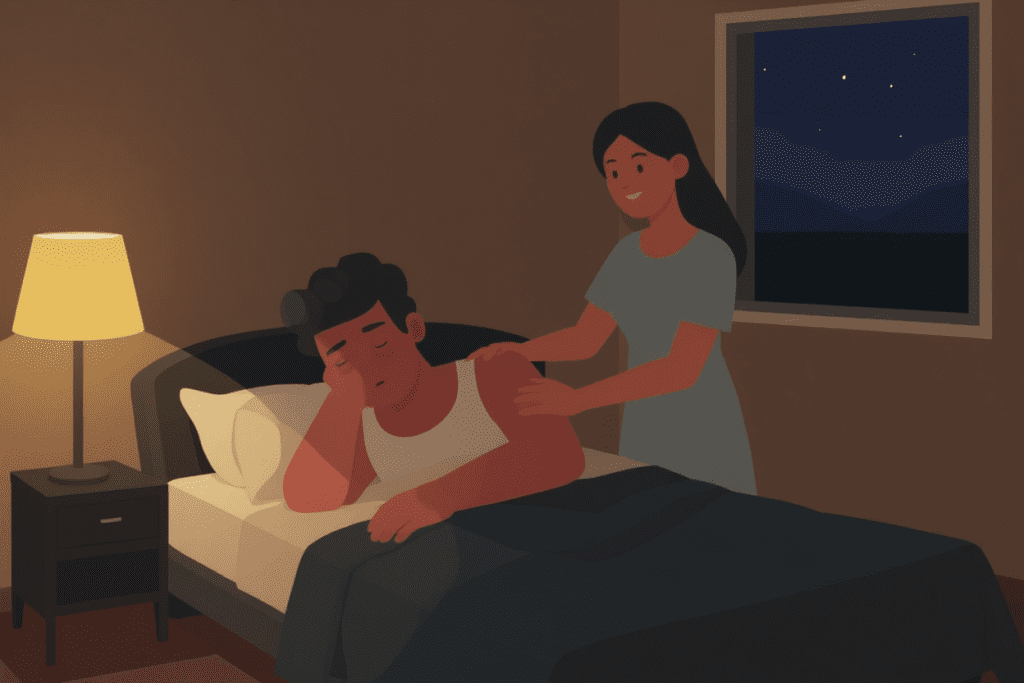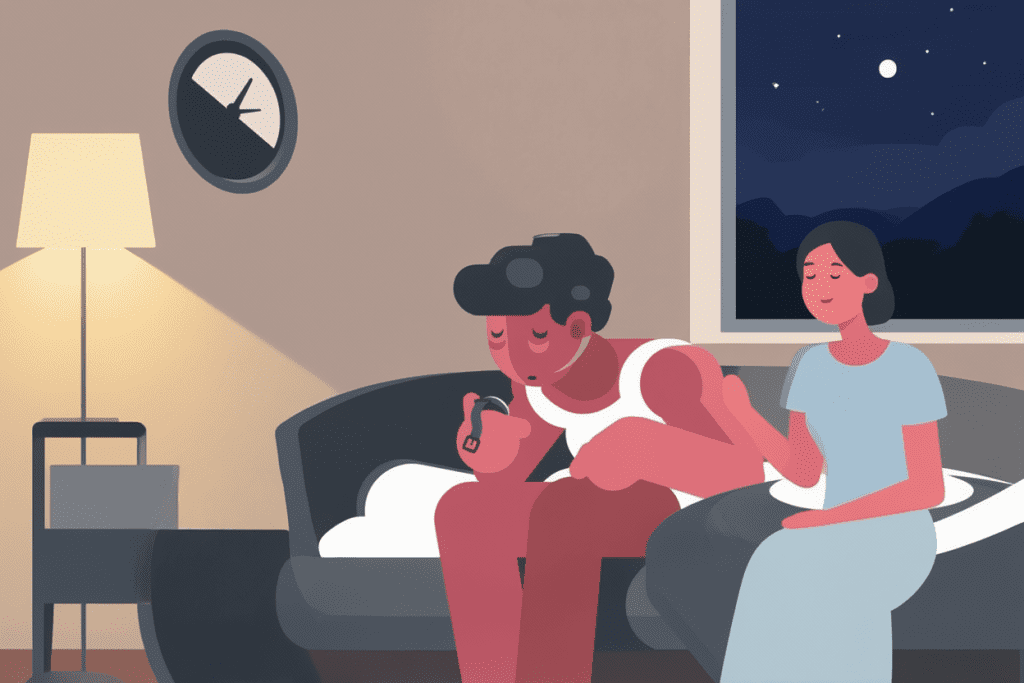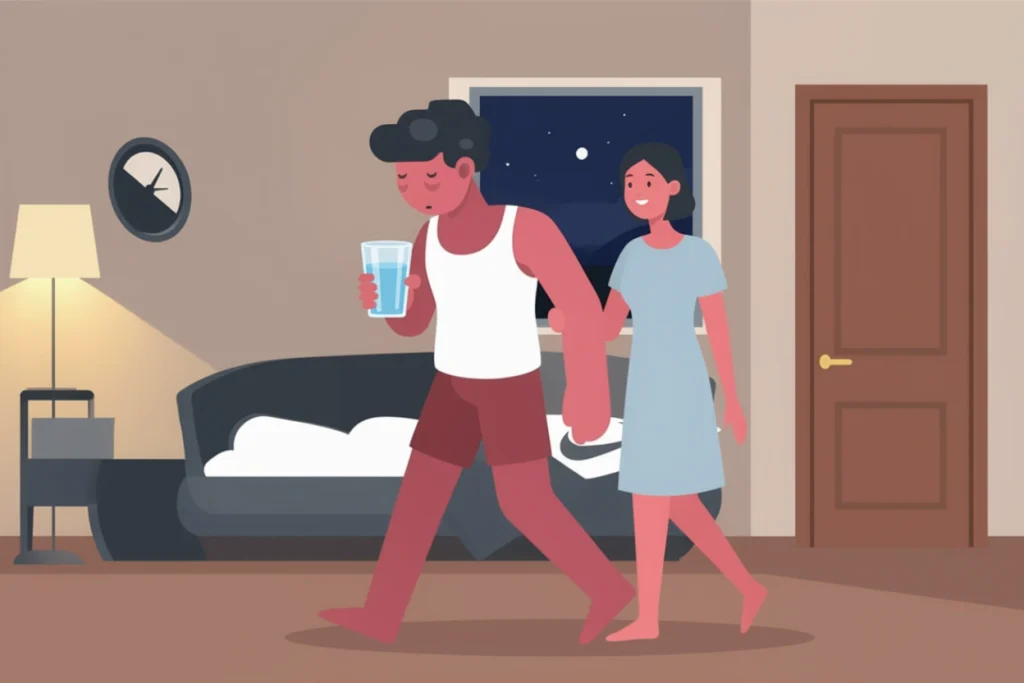What is Overnight Care at Home?
Overnight care at home is a specialised care service that provides professional support during nighttime, typically eight to ten hours per night. This type of home care enables people with multiple needs in complex situations to maintain their independence and continue living in their own homes rather than moving to a residential care facility.
The service is designed to meet a wide range of nighttime needs, from providing reassurance and peace of mind to delivering hands-on clinical care throughout the night. Support workers and clinical teams work closely with people and their families to create personalised care plans that address specific requirements, whether that involves monitoring health conditions, assisting with personal care, or simply being present in an emergency.

To inform you more on this subject, please take your time and visit our informative blog posts:
- What is Waking Night Care and Why is it Important?
- Waking Night Support Worker Duties
- Night Support Worker Duties and Responsibilities
Difference Between Daytime and Nighttime Care
Daytime care focuses on supporting people with activities of daily living:
- Meal preparation
- Personal and home hygiene
- Administering medication
- Social activities
- Community engagement
Nighttime care addresses the unique challenges that arise during sleeping hours:
- Monitoring health conditions that become more apparent after dark
- Supporting people with dementia who experience sundowning or increased confusion and offering reassurance
- Assisting people with epilepsy who may be at greater risk of nocturnal seizures
- Helping people with mobility challenges get to the bathroom safely
- Administering and monitoring medications for chronic pain or complex medical conditions
- Repositioning to prevent pressure sores
Who Provides it?
Trained support workers and clinical teams provide overnight care with the skills, qualifications, and compassion to meet people’s nighttime needs. These professionals receive specialist training in areas such as moving and handling, medication administration, managing behaviours that challenge, personal care, emergency response procedures, etc. They can be live-in carers 24/7 or overnight carers (8-10 hours per night).
Types of Overnight Care Services
Overnight care services can be tailored to match the level of support a person requires during the night. This may include managing medication schedules, mobility challenges, or unexpected health concerns during the quiet hours. All these different needs and circumstances require a separate type of support: sleeping night care and waking night care.

Sleeping Night Care
This type of care during the night works well for people who rarely need assistance during nighttime, but would benefit from the reassurance of having someone nearby in case of an emergency. The carer stays overnight, sleeping close to the supported person or in a separate room. The presence of a sleeping night carer can reduce anxiety, help people feel more secure, and provide families with peace of mind knowing their loved one is not alone.
The sleeping night carer assists with needs such as helping someone to the bathroom or responding to unexpected situations. But, if a person requires assistance more than twice during the nighttime, waking night care would be more suitable.
Waking Night Care
The waking night carer remains awake and alert throughout the whole night shift, providing continuous monitoring and proactive support whenever needed. This level of care is most suitable for people with multiple needs in complex situations, who require frequent assistance, regular observations, or specialist clinical interventions during nighttime hours.
Support workers providing a waking night care can assist with a wide range of tasks:
- administering medications
- supporting with toileting needs
- repositioning bed-bound people
- monitoring vital signs
- managing symptoms of chronic conditions
- providing emotional support
- responding to immediate change
Who Can Benefit from Overnight Care?
Overnight care at home supports people who may need help and care that extends into nighttime hours, such as:
- People with autism and learning disabilities who often experience sleep disturbances, anxiety in the dark, or require assistance with nighttime routines.
- People with dementia who may experience increased confusion, wandering or distress during sundowning and nighttime hours.
- People with different types of complex physical health needs, such as epilepsy, cerebral palsy, multiple sclerosis, or spinal injuries, who may require regular repositioning, medication management, or assistance with mobility and personal care during the night.
- Additionally, overnight care provides valuable respite for family members who are primary caregivers, allowing them to rest properly, knowing that their loved one is also receiving continuous help and support, all throughout the night.
Responsibilities of Overnight Caregivers
Support workers providing overnight care and support take on a responsible role that addresses the physical and emotional needs of the people they support.

Their responsibilities include:
- Safety and well-being alertness to any changes in condition or signs of distress.
- Personal care assistance with toileting and personal hygiene.
- Administering medications according to the time and dosage prescribed in the care plan, monitoring for any adverse reactions, and providing an accurate record of all medications given.
- Mobility assistance, including supporting peopleto get in and out of bed safely, supporting visits to the toilet and the bathroom, and repositioning people in their beds to prevent pressure sores.
- Emotional support and reassurance to people with anxiety, confusion, or feelings of loneliness at night.
- Emergency response, following established protocols and contacting emergency services when needed.
- Domestic duties, including tidying, laundry, or preparations for the next day.
- Documentation and reporting of all activities and concerns on a daily basis.
Qualities to Look for in an Overnight Caregiver
When selecting the right overnight caregiver, you should carefully consider their professional qualifications as significantly as their personal characteristics. They both contribute to quality care and support. Here is a list of their qualities families and commissioners should look for:
- Patience and compassion. Nighttime hours could be a sensitive time to work, especially with people who may be more vulnerable or distressed in the nighttime hours.
- Physical stamina and alertness. Remaining awake and attentive during the night requires exceptional physical strength and preparedness.
- Strong communication skills. Understanding people’s needs and liaising with their family members takes effective interaction.
- Problem-solving skills. Thinking critically, assessing rightly, and acting quickly to every unexpected challenge.
- Attention to detail. Recognising subtle changes in conditions and behaviours can determine whether support leads to progress or setbacks.
- Respect. Dignity, privacy, and personal preferences above all.
If you or someone you care for would benefit from home-based care, contact Unique Community Services to discuss how we can create tailor-made support for your needs and preferences.
You can also find our supportive teams in our offices in Manchester and Leeds.
